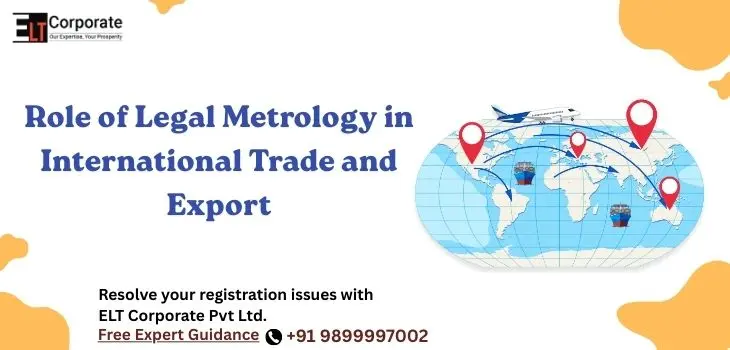The Role of legal metrology plays an important ensuring fairness, transparency and standardization in international trade and exports. By regulating loads, measures and labelling practices, ensures that consumers comply with international standards protecting the interests.For exporters, compliance with legal metros rules is not only a legal requirement, but also a strategic tool for gaining confidence in global markets.
What is Legal Metrology in the Context of International Trade?
role of Legal metrology refers to the application of legal requirements for measurement and measurement devices. In international trade, it controls how the goods are measured before export, pack and label. This ensures that the products meet both domestic and international regulatory standards, reduce disputes, punishment at business obstacles and customs.
Why is Legal Metrology Important for Exporters?
- Market Access Compliance – Ensures products meet the import regulations of the destination country.
- Consumer Protection – Prevents unfair trade practices by standardizing measurement and labeling.
- Reducing Trade Barriers – Harmonized metrology practices reduce technical obstacles to trade.
- Brand Trust and Credibility – Compliance builds the exporter’s reputation in global markets.
- Legal Safeguards – Prevents penalties, rejections, or delays during customs clearance.
Key Benefits of Legal Metrology in Export
- Standardized packaging and labeling – the global acceptance of products increases.
- Smooth custom withdrawal – reduces delays and disputes on international borders.
- Increased competition – Companies following metrology standards achieve a competitive lead.
- The WTO and International Trade Movements support – align with global trade policies and agreements.
Documents Required for Export Compliance under Legal Metrology
Exporters need to maintain and present certain documents under role of Legal Metrology to comply with both Indian and international requirements:
- Export License / Import-Export Code (IEC).
- Registration Certificate under Legal Metrology Packaged Commodities Rules (if applicable).
- Product Packaging and Labeling details (stickers, labels, barcodes).
- Weighing and Measuring Instruments’ Calibration Certificates.
- GST Registration and Company Incorporation Documents.
- Declaration of product quantity, net weight, and MRP (if required by importing country).
Process of Compliance for Exporters
- Application Filing – Exporters must apply for Legal Metrology certificates/licenses as per product type.
- Submission of documents – provide packaging, labeling and calibration details.
- Verification by the Authority – Officers can inspect packaging, weight and labeling.
- Approval and Issue issuing – Once verified, exporters receive approval for smooth trade.
- Renewal and Maintenance – Exporters must renew the license from time to time and maintain records.
Industries Requiring Legal Metrology Compliance for Export
- Food and Beverages
- Pharmaceuticals & Cosmetics
- Electronics & IT Hardware
- Textiles & Apparel
- Chemicals & Fertilizers
- Automotive Components
- Agriculture & Seeds Industry
Penalties for Non-Compliance
Non-compliance with Legal Metrology regulations in exports can result in:
- Heavy fines or penalties.
- Delay or rejection of consignments at customs.
- Suspension or cancellation of export licenses.
- Loss of brand reputation in international markets.
LMPC for Import vs Legal Metrology for Export
| Aspect | LMPC Certificate for Import | Legal Metrology in Export |
| Purpose | Ensures prior-pasted goods imported into India Labeling and measurement standard. | This ensures that the goods exported from India comply with international labeling, Packaging, and measurement criteria. |
| Applicable Law | Legal Metrology (Packaged Commodities) Rules, 2011 & Legal Metrology Act, 2009. | Legal Metrology Act, 2009 and international trade agreements (WTO, OIML guidelines). |
| Who Needs It? | Importers, manufacturers and packers bringing pre-paired goods to India. | Exporters, manufacturers, and traders selling goods to overseas markets. |
| Issuing Authority | State Controller of Legal Metrology (for single state) or central government (for multi-state). | Directorate of Legal Metrology, Ministry of Consumer Affairs, in alignment with export requirements. |
| Mandatory Documents | IEC Code, Trade License, Packaging Samples, MoA/Partnership Deed, GST Registration. | IEC Code, Packaging & Labeling Compliance Certificates, Calibration Certificates, Legal Metrology License. |
| Validity | 5 years, renewable before expiry. | Depends on export license terms; compliance must be maintained continuously. |
Withthe role of legal metrology compliance, exporters can expand to international markets with confidence, avoid expensive punishment, and create long -term beliefs with global partners.








